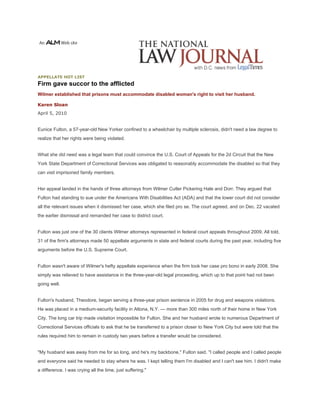
Sam in Appellate Hot List
- 1. APPELLATE HOT LIST Firm gave succor to the afflicted Wilmer established that prisons must accommodate disabled woman's right to visit her husband. Karen Sloan April 5, 2010 Eunice Fulton, a 57-year-old New Yorker confined to a wheelchair by multiple sclerosis, didn't need a law degree to realize that her rights were being violated. What she did need was a legal team that could convince the U.S. Court of Appeals for the 2d Circuit that the New York State Department of Correctional Services was obligated to reasonably accommodate the disabled so that they can visit imprisoned family members. Her appeal landed in the hands of three attorneys from Wilmer Cutler Pickering Hale and Dorr. They argued that Fulton had standing to sue under the Americans With Disabilities Act (ADA) and that the lower court did not consider all the relevant issues when it dismissed her case, which she filed pro se. The court agreed, and on Dec. 22 vacated the earlier dismissal and remanded her case to district court. Fulton was just one of the 30 clients Wilmer attorneys represented in federal court appeals throughout 2009. All told, 31 of the firm's attorneys made 50 appellate arguments in state and federal courts during the past year, including five arguments before the U.S. Supreme Court. Fulton wasn't aware of Wilmer's hefty appellate experience when the firm took her case pro bono in early 2008. She simply was relieved to have assistance in the three-year-old legal proceeding, which up to that point had not been going well. Fulton's husband, Theodore, began serving a three-year prison sentence in 2005 for drug and weapons violations. He was placed in a medium-security facility in Altona, N.Y. — more than 300 miles north of their home in New York City. The long car trip made visitation impossible for Fulton. She and her husband wrote to numerous Department of Correctional Services officials to ask that he be transferred to a prison closer to New York City but were told that the rules required him to remain in custody two years before a transfer would be considered. "My husband was away from me for so long, and he's my backbone," Fulton said. "I called people and I called people and everyone said he needed to stay where he was. I kept telling them I'm disabled and I can't see him. I didn't make a difference. I was crying all the time, just suffering."
- 2. REASONABLE ACCOMMODATION Fulton sued the department in December 2005 in the U.S. District Court for the Northern District of New York, asking that her husband be transferred to a closer prison as a reasonable accommodation for her disability so she could participate in the visitation program. She alleged that the department was violating the ADA by failing to accommodate her disability. U.S. District Judge Gary L. Sharpe ruled in October 2006 that Fulton lacked standing to sue under the ADA. Sharpe wrote that, although courts have protected the rights of inmates to have visitors, that right does not extend to spouses. That decision didn't sound right to Sam Lieberman, who came across Fulton's appeal through the 2d Circuit's pro bono program in 2008 when he was an associate at Wilmer (he has since left the firm for Bernstein Litowitz Berger & Grossmann). "I thought it was a compelling case," Lieberman said. "They just said no to a transfer. They didn't consider any other options for reasonable accommodation. The lower court said, 'You don't even have a right, as a spouse, to visit an inmate.' " Lieberman was joined by Wilmer partner Douglas Curtis and senior associate Shauna Friedman on Fulton's legal team. They began developing an appellate strategy, ultimately spending more than 400 hours on the case. "When we got involved, we saw that she was looking for a reasonable accommodation, not just a transfer," Curtis said. "A transfer would have been nice, but there were other things the Department of Corrections could have done, such as video conferencing or bringing him temporarily to a closer location so she could visit her husband. They ignored those options." The Wilmer team argued before the 2d Circuit that the lower court had missed the thrust of the case. "Under the district court's reasoning, [department] facilities are zones in which spousal visitors' rights to familial association terminate and the ADA and the Rehabilitation Act no longer apply," they wrote in their brief. The three-judge panel agreed with that reasoning. "Indeed, the complaint is unequivocal that the defendants' alleged discrimination caused her claimed injury, and that this litigation could remedy the harm," their decision reads. "Thus, we hold that Fulton has standing to pursue her ADA and Rehabilitation Act claims, and that the district court erred by concluding otherwise." Lieberman took a break from a vacation in Israel to call Fulton and deliver the good news. Her husband had since been released from prison, but she had been unable to see him during the three years he was in custody. With Lieberman's assistance, she is pursuing the case in hopes of collecting monetary damages and forcing changes to department policy pertaining to accommodation for disabled visitors.
- 3. "She is a very strong-willed human who has a sense of right and wrong," Curtis said. "She knew she was getting short shrift from the prison system. Even after her husband was released, it was a matter of principle for her." Contact Karen Sloan at ksloan@alm.com.